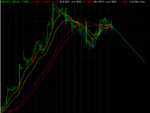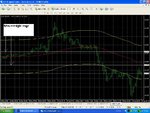Baruch said:
I said most, not all, technical traders lose. Most small traders use only charts - and 95% of them lose. Why? 🙄
I realised after you said most. My fault. I dont know how they know the figure, but i guess 90/95% could be accurate.
Why? good question Barauch.
My reasoning to why is that there are two types of techinical analysis. One method based on prediction, ie, using oscillators and past price history to predict future price, example, RSI above 70/80 then sell. This is the rule what the books say. But of course it doenst work like that.
Another one is chart patterns which techincal traders have read about in the text books. Again the assumption is that if pattern x forms then this should be the outcome...again it doesnt work like that in real life.
The other reason I think alot lose is that they may be using a system which has been developed by someone else, or a system they read about inb a magazine or a popular trading book. Again they are using a system that wasnt developed by themselves. They have accepted it on blind faith maybe. Again blind faith is no faith.
The other downfall of using these easily conceived systems and popular systems is that they dont know the underlying market philosophy behind them. They dont know why the system works or why it doesnt. This means its harder to have confidence in when times are bad. This is why a great number of commercial systems dont work.
Another reason I think might play a role in this losing number is that a great deal of technical traders day trade. I m not saying you can t be successful this way. But lets say you trade 10 times a day, with a 4 pip spread. This is like starting at -40 pips. Its very difficult. And the pairs with the bigger daily ranges have bigger spreads. Whereas look at the medium term trader , afew days to a few weeks, one trade at 4 pip spread and a win of 400 pips.
Now I said there are 2 types of TA. The other one isnt based on price prediction, but rather price action, and I think this is IME and IMO the way to use TA successfully. I ve totally accepted i can t make any predictions about markets direction.
I think the system needs to be developed by yourself systematically and logically, by moving from what you to know to the unknown. Step by step. The system should be the quantified rules derived from your beliefs about the markets.
For example I believe that the longer a market stays in a range the probability of a breakout increases. This a simple belief. But is it true? How to define if its true? What intruments can confirm this?
But then I have to ask wHat is a range? How is this defined per se? Is a range the same in all markets? How do you measure range? Is there more than one way? In waht time frame?
The questions go on. The only way to answer these is through looking back over a long period and then observation in the present. If and when you answer each questuion backed by sound logic and proof, then move on to the next question.An answered question usually poses another unknown. This is what I mean by moving from the known to the unknown. A bit like the unkwon X in algebra. Then that knowledge becomes your own, because you investigated it by yourself. Now thats where the confidence gets rooted inside, when you dont worry about the losers.
Once you answer any questions you need to know, and you have formed certain beliefs about the market, then you have to form rules from these. My belief is that what market is doing is the most important thing...but what instrument can I use to tell me what the price is doing. Candles, MA, EMA? etc etc
I ve found this method of research to be helpful for me because i gain confidence this way and its not a black box system.


